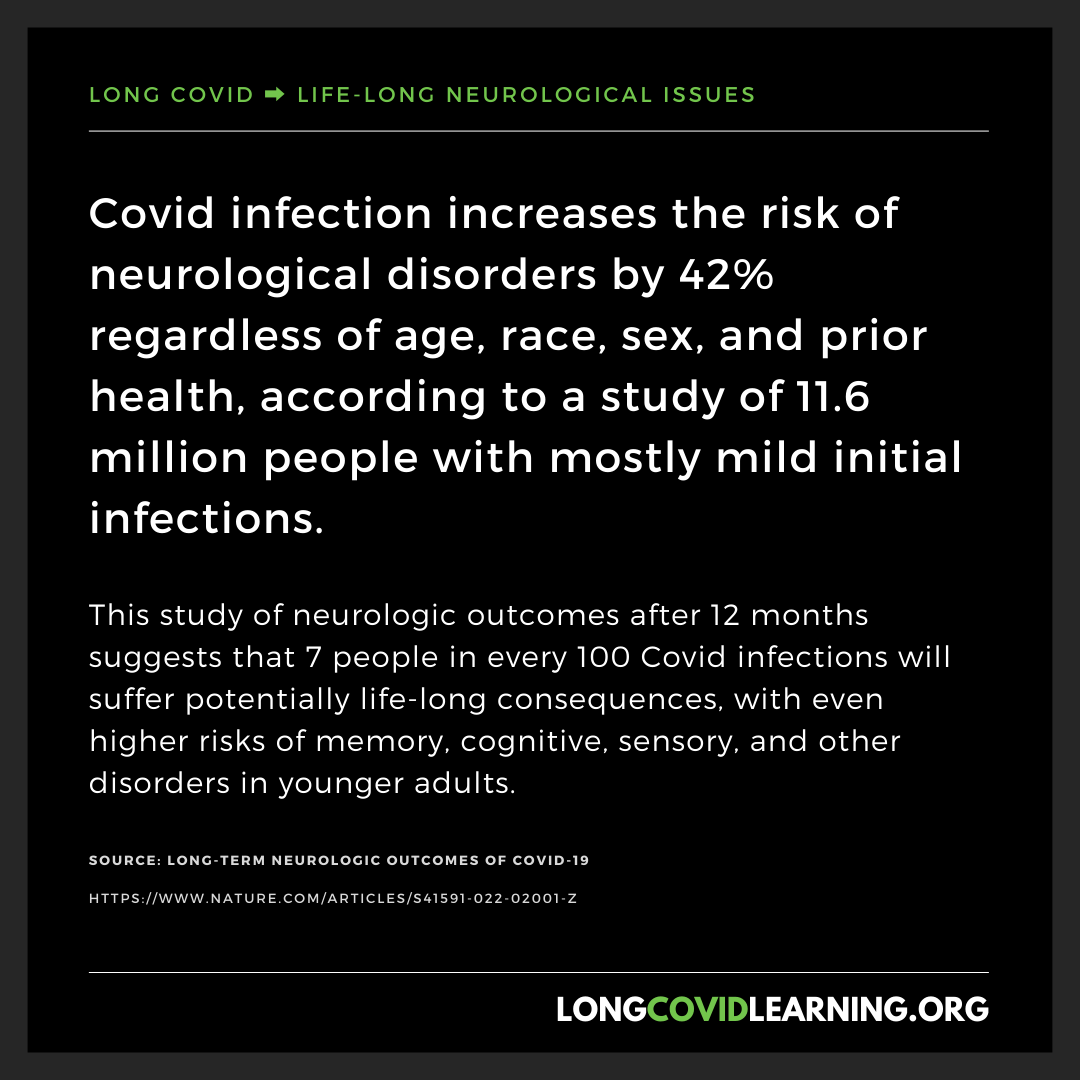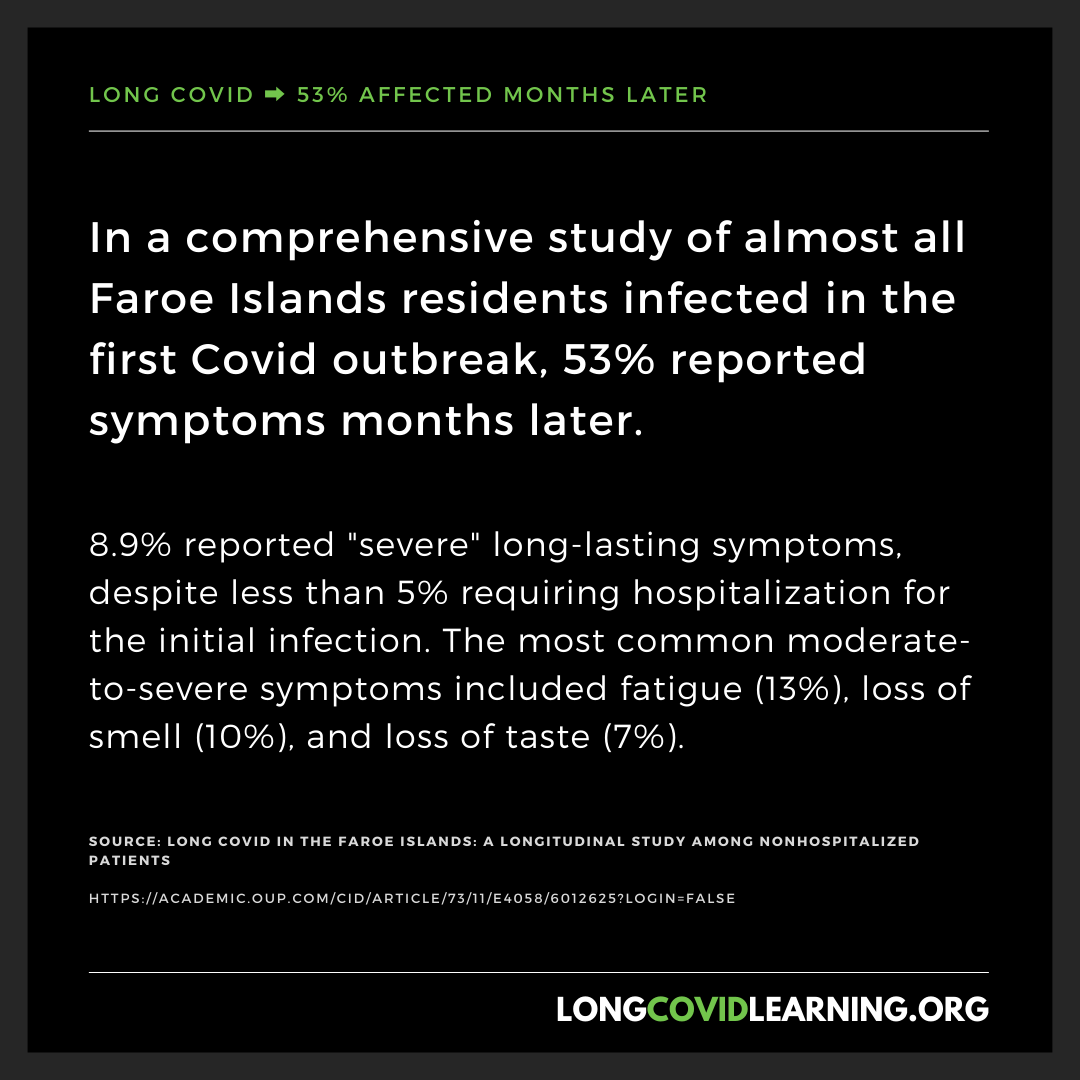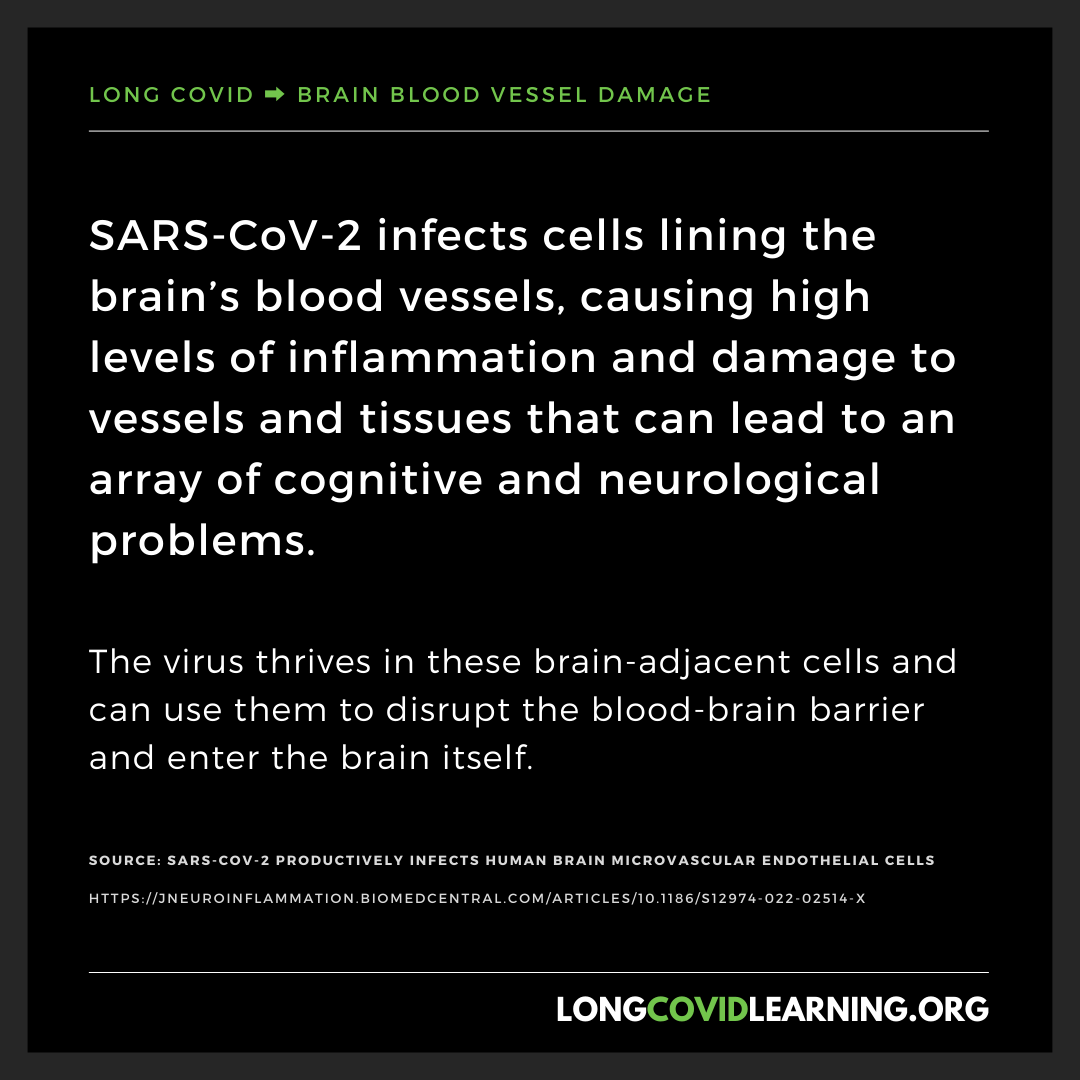
All the research
Long Covid Learning collects research from scientists worldwide and summarizes the findings to make takeaways more accessible to those outside the research community. Study summaries can be shared as links or images in messages and social media.
Visit “The Research” to navigate by topic or to search by keyword.
Persistent systemic infection for months
In people who died of Covid, the virus was found in various tissues throughout the body, including the brain, as late as 230 days following the symptom onset of an acute infection. In some patients, the virus can cause systemic infection and persist in the body for months. Among the other affected organs and tissues are the heart and blood vessels, lungs and the respiratory system, muscles, skin, thyroid, esophagus, spleen, appendix, adrenal glands, ovaries, testes, and womb.
In people who died of Covid, the virus was found in various tissues throughout the body, including the brain, as late as 230 days following the symptom onset of an acute infection.
In some patients, the virus can cause systemic infection and persist in the body for months. Among the other affected organs and tissues are the heart and blood vessels, lungs and the respiratory system, muscles, skin, thyroid, esophagus, spleen, appendix, adrenal glands, ovaries, testes, and womb.
Source: SARS-CoV-2 infection and persistence in the human body and brain at autopsy | Nature
Share the research
Follow us on social media to easily share this study and others with your friends, family, colleagues, and communities. Help us raise awareness of the risk Long Covid poses to us all.
77% affected 12 months later
12 months after mostly mild Covid infections, only 23% were symptom-free. Patients reported significantly reduced physical and mental quality of life from symptoms like reduced exercise capacity (56%), fatigue (53%), breathing problems (38%), and trouble concentrating (40%) and finding words (32%). Researchers also found signs of the immune system attacking healthy cells.
12 months after mostly mild Covid infections, only 23% were symptom-free.
Patients reported significantly reduced physical and mental quality of life from symptoms like reduced exercise capacity (56%), fatigue (53%), breathing problems (38%), and trouble concentrating (40%) and finding words (32%). Researchers also found signs of the immune system attacking healthy cells.
Share the research
Follow us on social media to easily share this study and others with your friends, family, colleagues, and communities. Help us raise awareness of the risk Long Covid poses to us all.
53% affected 6-12 months later
53.1% of those with a confirmed Covid infection reported symptoms like mental and physical exhaustion, sleep problems, and cognitive problems 6-12 months later, as compared to 11.5% of those without a confirmed infection. 1 in 14 patients was newly diagnosed with depression, anxiety, chronic fatigue symptom (CFS), fibromyalgia, or PTSD within the first year after a confirmed Covid infection.
53.1% of those with a confirmed Covid infection reported symptoms like mental and physical exhaustion, sleep problems, and cognitive problems 6-12 months later, as compared to 11.5% of those without a confirmed infection.
1 in 14 patients was newly diagnosed with depression, anxiety, chronic fatigue symptom (CFS), fibromyalgia, or PTSD within the first year after a confirmed Covid infection.
Share the research
Follow us on social media to easily share this study and others with your friends, family, colleagues, and communities. Help us raise awareness of the risk Long Covid poses to us all.
Damage to multiple organs
59% of those with Long Covid — most of whom were not hospitalized at the time of infection — were found to have suffered organ damage (spanning heart, lungs, kidneys, liver, pancreas, and spleen) in a longitudinal and prospective study. Organ impairment and symptoms like fatigue, breathlessness and cognitive dysfunction continued to have high prevalence after 12 months, with significant impact on quality-of-life.
59% of those with Long Covid — most of whom were not hospitalized at the time of infection — were found to have suffered organ damage (spanning heart, lungs, kidneys, liver, pancreas, and spleen) in a longitudinal and prospective study.
Organ impairment and symptoms like fatigue, breathlessness and cognitive dysfunction continued to have high prevalence after 12 months, with significant impact on quality-of-life.
Source: Multi-organ impairment and Long COVID: a 1-year prospective, longitudinal cohort study | medRxiv
Share the research
Follow us on social media to easily share this study and others with your friends, family, colleagues, and communities. Help us raise awareness of the risk Long Covid poses to us all.
Life-long neurological issues
Covid infection increases the risk of neurological disorders by 42% regardless of age, race, sex, and prior health, according to a study of 11.6 million people with mostly mild initial infections. This study of neurologic outcomes after 12 months suggests that 7 people in every 100 Covid infections will suffer potentially life-long consequences, with even higher risks of memory, cognitive, sensory, and other disorders in younger adults.
Covid infection increases the risk of neurological disorders by 42% regardless of age, race, sex, and prior health, according to a study of 11.6 million people with mostly mild initial infections.
This study of neurologic outcomes after 12 months suggests that 7 people in every 100 Covid infections will suffer potentially life-long consequences, with even higher risks of memory, cognitive, sensory, and other disorders in younger adults.
Source: Long-term neurologic outcomes of COVID-19 | Nature Medicine
Share the research
Follow us on social media to easily share this study and others with your friends, family, colleagues, and communities. Help us raise awareness of the risk Long Covid poses to us all.
Loss of brain “gray matter”
Imaging of the brain before and after Covid infection showed significant loss of brain tissue — even for "mild" cases that did not require hospitalization — in areas responsible for behavioral and emotional response, memory, and more. The reduction in overall cortical gray matter is equivalent to what older adults lose over years of aging.
Imaging of the brain before and after Covid infection showed significant loss of brain tissue — even for "mild" cases that did not require hospitalization — in areas responsible for behavioral and emotional response, memory, and more.
The reduction in overall cortical gray matter is equivalent to what older adults lose over years of aging.
Source: SARS-CoV-2 is associated with changes in brain structure in UK Biobank | Nature
Share the research
Follow us on social media to easily share this study and others with your friends, family, colleagues, and communities. Help us raise awareness of the risk Long Covid poses to us all.
Toxic proteins in the brain
Covid virus can produce proteins that form deposits that are toxic to nerve cells, like those found with Alzheimer's and Parkinson's diseases. These "amyloid structures" may explain long-lasting neurological symptoms after Covid: memory loss, sensory confusion, severe headaches, brain inflammation, cognitive and psychiatric issues, and even stroke, as well as the risk of neurodegenerative diseases.
Covid virus can produce proteins that form deposits that are toxic to nerve cells, like those found with Alzheimer's and Parkinson's diseases.
These "amyloid structures" may explain long-lasting neurological symptoms after Covid: memory loss, sensory confusion, severe headaches, brain inflammation, cognitive and psychiatric issues, and even stroke, as well as the risk of neurodegenerative diseases.
Share the research
Follow us on social media to easily share this study and others with your friends, family, colleagues, and communities. Help us raise awareness of the risk Long Covid poses to us all.
Similarities to chemotherapy
Studies of the brain after even mild Covid infections show lasting damage to parts of neurons (including their "myelin sheaths") that are essential to cognitive, sensory, and motor function. Similar damage causes the side effects from aggressive chemotherapy, potentially explaining why Long Covid "brain fog" resembles concentration and memory problems suffered by some cancer patients ("chemo-fog").
Studies of the brain after even mild Covid infections show lasting damage to parts of neurons (including their "myelin sheaths") that are essential to cognitive, sensory, and motor function.
Similar damage causes the side effects from aggressive chemotherapy, potentially explaining why Long Covid "brain fog" resembles concentration and memory problems suffered by some cancer patients ("chemo-fog").
Source: Mild respiratory COVID can cause multi-lineage neural cell and myelin dysregulation - ScienceDirect
Share the research
Follow us on social media to easily share this study and others with your friends, family, colleagues, and communities. Help us raise awareness of the risk Long Covid poses to us all.
Metabolic issues in the brain
Scans show that specific parts of the brain have significantly lower energy use in individuals with Long Covid. These abnormal scans clearly separate healthy patients from those with Long Covid symptoms, who report loss of smell and taste, memory problems, sleep disorders, chronic pain, and other symptoms weeks or months after the initial infection.
Scans show that specific parts of the brain have significantly lower energy use in individuals with Long Covid.
These abnormal scans clearly separate healthy patients from those with Long Covid symptoms, who report loss of smell and taste, memory problems, sleep disorders, chronic pain, and other symptoms weeks or months after the initial infection.
Source: 18F-FDG brain PET hypometabolism in patients with long COVID | SpringerLink
Share the research
Follow us on social media to easily share this study and others with your friends, family, colleagues, and communities. Help us raise awareness of the risk Long Covid poses to us all.
Psychiatric and brain disease
Covid significantly raises the risk of both psychiatric disorders and neurological diseases such as dementia, brain hemorrhage, stroke, and Parkinson’s. 34% of the 236,379 patients were diagnosed with these illnesses in the months after Covid infection — the first such diagnosis for 13% of them. Researchers note that risks “appear widespread” and “persist up to, and probably beyond, 6 months.”
Covid significantly raises the risk of both psychiatric disorders and neurological diseases such as dementia, brain hemorrhage, stroke, and Parkinson’s.
34% of the 236,379 patients were diagnosed with these illnesses in the months after Covid infection — the first such diagnosis for 13% of them. Researchers note that risks “appear widespread” and “persist up to, and probably beyond, 6 months.”
Share the research
Follow us on social media to easily share this study and others with your friends, family, colleagues, and communities. Help us raise awareness of the risk Long Covid poses to us all.
Brain infections in kids
A children's hospital in the U.S. noticed a 236% increase in rare and dangerous bacterial infections in the brain, many of which were diagnosed during or immediately after Covid infection. A follow-up survey found increases in these infections in 43% of responding U.S. hospitals.
A children's hospital in the U.S. noticed a 236% increase in rare and dangerous bacterial infections in the brain, many of which were diagnosed during or immediately after Covid infection.
A follow-up survey found increases in these infections in 43% of responding U.S. hospitals.
Share the research
Follow us on social media to easily share this study and others with your friends, family, colleagues, and communities. Help us raise awareness of the risk Long Covid poses to us all.
53% affected months later
In a comprehensive study of almost all Faroe Islands residents infected in the first Covid outbreak, 53% reported symptoms months later. 8.9% reported "severe" long-lasting symptoms, despite less than 5% requiring hospitalization for the initial infection. The most common moderate-to-severe symptoms included fatigue (13%), loss of smell (10%), and loss of taste (7%).
In a comprehensive study of almost all Faroe Islands residents infected in the first Covid outbreak, 53% reported symptoms months later.
8.9% reported "severe" long-lasting symptoms, despite less than 5% requiring hospitalization for the initial infection. The most common moderate-to-severe symptoms included fatigue (13%), loss of smell (10%), and loss of taste (7%).
Share the research
Follow us on social media to easily share this study and others with your friends, family, colleagues, and communities. Help us raise awareness of the risk Long Covid poses to us all.
Brain blood vessel damage
SARS-CoV-2 infects cells lining the brain’s blood vessels, causing high levels of inflammation and damage to vessels and tissues that can lead to an array of cognitive and neurological problems. The virus thrives in these brain-adjacent cells and can use them to disrupt the blood-brain barrier and enter the brain itself.
SARS-CoV-2 infects cells lining the brain’s blood vessels, causing high levels of inflammation and damage to vessels and tissues that can lead to an array of cognitive and neurological problems.
The virus thrives in these brain-adjacent cells and can use them to disrupt the blood-brain barrier and enter the brain itself.
Share the research
Follow us on social media to easily share this study and others with your friends, family, colleagues, and communities. Help us raise awareness of the risk Long Covid poses to us all.
Damaged nervous system
SARS-CoV-2 can directly infect and reproduce in the cells of the central and peripheral nervous system. The resulting damage may be a cause of brain fog, cognitive and memory problems, dizziness, headaches, and other long-term symptoms that are frequent after Covid infection.
SARS-CoV-2 can directly infect and reproduce in the cells of the central and peripheral nervous system.
The resulting damage may be a cause of brain fog, cognitive and memory problems, dizziness, headaches, and other long-term symptoms that are frequent after Covid infection.
Share the research
Follow us on social media to easily share this study and others with your friends, family, colleagues, and communities. Help us raise awareness of the risk Long Covid poses to us all.












































































